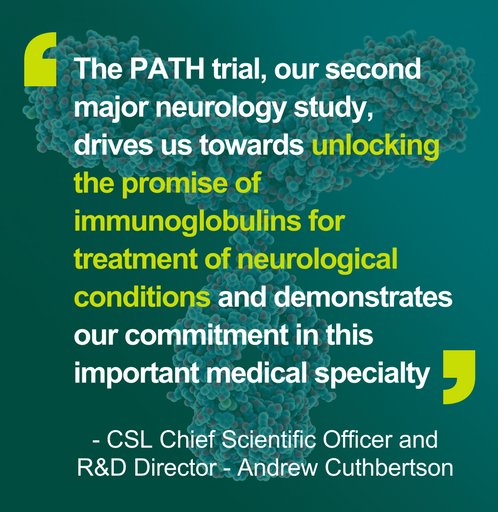Largest Ever CIDP Clinical Study Completed

PATH study evaluated subcutaneous immunoglobulin efficacy and safety for treating Chronic Inflammatory Demyelinating Polyneuropathy
KING OF PRUSSIA, Pa. – 01 March 2017 – Global biotherapeutics leader CSL Behring announced today that it has completed the largest ever Chronic Inflammatory Demyelinating Polyneuropathy (CIDP) trial, known as PATH (Polyneuropathy And Treatment with Hizentra®). The Phase III clinical trial was designed to demonstrate the efficacy, safety and tolerability of two different doses of CSL Behring’s subcutaneous immunoglobulin (SCIG), Hizentra® (Immune Globulin Subcutaneous [Human]), compared with placebo, in the maintenance treatment of CIDP patients previously treated with intravenous immunoglobulin (IVIG).
Hizentra, the no. 1 prescribed immunoglobulin therapy in treating primary immunodeficiencies (PI), the most prescribed SCIG worldwide, and the only 20% SCIG designed with the natural stabilizer L-proline, was self-administered by patients. Throughout the study, subjects were allowed to use dose volumes up to 50 mL/site and infusion rates of up to 35 mL/hour, to provide them with greater flexibility and autonomy to infuse when and where they choose. A long-term open label extension study is ongoing and is expected to be completed in 2017.
“Patients living with CIDP experience different symptoms with varying severities. We value organizations like CSL Behring whose ongoing neurology research continues to look at bringing new options for patients, caregivers and physicians to choose the individualized treatment that’s right for each patient,” said Lisa Butler, Executive Director, GBS/CIDP Foundation International.
“The PATH trial, our second major neurology study, drives us towards unlocking the promise of immunoglobulins for treatment of neurological conditions and demonstrates our commitment in this important medical specialty,” says Andrew Cuthbertson, ChiefScientific Officer and R&D Director. “We look forward to sharing the results of the PATH trial with colleagues at key neurology congresses this year.”
Investigators and patients in over 10 countries participated during the last five years to bring this groundbreaking prospective, multicenter, randomized, double-blind, placebo-controlled clinical trial to completion. A trial of this scale will contribute greatly to our understanding of these patients.
CIDP is a rare disorder of the peripheral nerves (those outside the brain and spinal cord). The condition is immune-mediated and the effects can worsen over time. The protective covering of the nerves is damaged, which may cause numbness or tingling, muscle weakness, fatigue and other symptoms. CIDP can occur at any age and is more common in men than in women. If left untreated, approximately 30 percent of CIDP patients will progress to wheelchair dependence.
Hizentra (Immune Globulin Subcutaneous [Human]), the first 20 percent SCIG developed for subcutaneous use, is registered in over 46 countries and approved in North America, Europe and Japan. Hizentra, the world’s most prescribed SCIG, has a proven track record of safety, efficacy and tolerability and has over 3.6 million exposures worldwide since 2010. In the United States, Hizentra is indicated for the treatment of patients with primary immunodeficiency and contraindicated in individuals with a history of anaphylactic or severe systemic response to immune globulin preparations or components of Hizentra, as well as in persons with selective immunoglobulin A deficiency who have known antibody against IgA and a history of hypersensitivity. In all 29 European/European Economic Area member states and Japan, Hizentra is authorized for treating patients diagnosed with PI as well as secondary immunodeficiencies.
